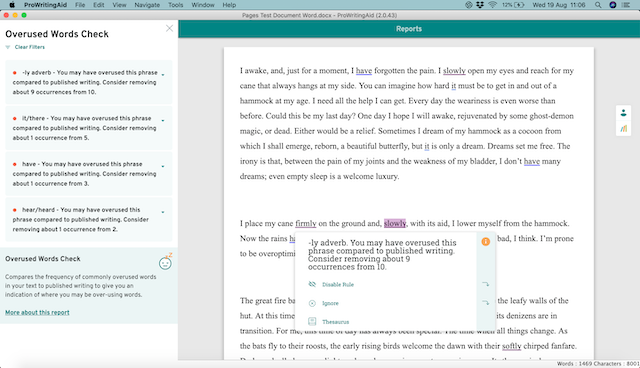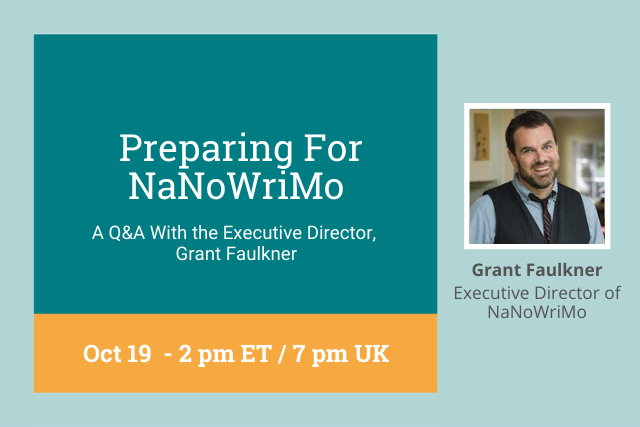
For hundreds of thousands of writers scattered across the world, October 31 is day of mixed emotions. Think of it as a kind of writer's Christmas Eve - but instead of presents the next day you get a blank page and panic. Happy holidays!
November 1 is the first day of National Novel Writing Month, aka NaNoWriMo. The aim of the game is to write a 50,000 word novel in 30 days. If we crunch the numbers, thats 1666.67 words a day for 30 days. Yikes.
I've tried a few times. Some attempts ended in utter failure, while other times I was successful. One thing's for sure: I learned a lot along the way.
Whether you are a first time participant or a seasoned writer, there's always more to learn about getting through NaNoWriMo. Here's my beginner's guide.
1. Have a Plan
There's a common NaNoWriMo misconception. Many beginners sit down to write on November 1 thinking that the challenge only lasts 30 days.
Okay, so that might technically be true. But if you really want to succeed, it's worth taking time before November starts to think about planning your novel. Usually, I'm more of an impulsive writer and like to create on the go, but for NaNoWriMo I make an exception. How much detail you go into is up to you, but having a plan for your novel can be a lifesaver.
This is especially true if you've never written a novel before, or are used to writing it in chunks of time you find here and there. NaNoWriMo is a significant undertaking. Instead of only coming to your computer once in a blue moon to write when inspiration hits, you'll be trying to make inspiration hit every day for 1,667 (ish) words at a time.
Having a plan for where you want your story to go makes sure that you always have some idea of what it is you're sitting down to write.
How Do I Plan My Novel?
Jot down ideas of subjects you want to write about as they come to you.
Find someone to use as a sounding board and bounce ideas off of them. Even if the person you choose doesn't care about books or writing, sometimes they come up with ideas that may sound ridiculous to them, but that could become central to your story.
After you have an idea, make a small outline. Even if it’s only 3 points, it will give you something to go off. If this sounds boring, why not try some of our inventive ways for outlining your novel?
If you really want to get ahead of the game, follow our detailed guide to planning your story before you start writing. You'll learn how to keep focussed on your central idea so that you always know what to write next.
2. Use a Progress Tracker
Establishing your daily goal seems simple. To finish 50,000 words in 30 days means writing 1,667 words every day.
We all have visions of ourselves waking up at 6am, refreshed and ready to write. We'll float to our writing desks, get our heads down, and write. We definitely won't spend a 20 minutes gazing out the window. And we definitely won't have hit snooze on our alarms.
Life happens. Sometimes you can write more, sometimes less.
Progress trackers are a great tool to help keep track of your writing. Planning your NaNoWriMo journey through word count can help you work out whether you're on track. Yes, you can aim for the holy grail of 1,667 words each day. But if you stray away from this a little, don't worry.
You might write 1,200 words on Monday, but on Thursday you hit an inspiration goldmine and write 2,200. On level, you're still on track. By monitoring your progress, you'll see when you can ease off a little and when you need to go full steam ahead.
It’s easy to lose track of where you stand in your novel, so keep this tool handy to make sure you don’t fall behind.
3. Know Your Writing
If you've decided to write a novel, chances are you've written something else before. It doesn't have to be long–it could be an online journal, a short story, even a 1,000 word snippet of an idea.
Before you start your novel, it's good to get to know your writing. Run something you've written before through ProWritingAid–it's not just an editing tool.
The Overused Words report can tell you which words and phrases you rely on most to get your ideas across.

If you're writing quickly, it's easy to fall back on the same phrasing repeatedly. Having a prior knowledge of the words you use over and over again will help you to avoid them when you're writing your novel. You don't need to aim for perfect, in your first draft but entering into NaNoWriMo informed will lead to you producing a better piece of writing first time.
ProWritingAid will also highlight repeated sentence starts, un-varied sentence lengths and sticky sentences so that you can go into NaNoWriMo as a better writer from the start.
The best way to find out how much ProWritingAid can do is to try it yourself!
4. Avoid Negativity
Remember those visions of ourselves as paragons of productivity? Don't hold yourself to them.
It can come from ourselves or it can come from other people, but nothing damages the creative spirit more than a voice saying we can’t write. Even some seemingly constructive advice can cause us to doubt ourselves. It’s important to know when to listen and when to tune out advice from others.
Find someone who will be your cheerleader and support your endeavor. Usually, our biggest critic is ourselves, so having someone to pick us up when we are down will help to ignite our proverbial fires and get us back to writing.
5. Prevent Burnout
Here's a warning from someone who has tried and failed at NaNoWriMo in the past. By day 15, you might start to lose your mojo. Take a day off and recharge if you need to, just make sure you are able to make up the word count.
There'll be a voice in your head telling you to just push through, but knowing when to pause and take stock is just as important as knowing when to power on. Spend some time working on another hobby or plan a day to spend outdoors or in a new environment. Not only is it fun, but it can help get your creative mojo going.
6. Have an ending
When you begin writing, have an ending planned out. Think of it as setting a goal. You already know what the outcome is, now you just have to create the adventure that gets you and your readers there.
Your ending may change as you get closer to finishing your story. That’s fine. Have an idea of how your story will end to keep you on track.
7. Keep a Notebook Handy
One beginner's downfall is trusting your own memory when you have a million other things going on.
Ideas will come in one brilliant flash. Always keep a small notebook and pen on your person. That way when the ideas come, you're not caught off guard. Don’t fall for the “Oh I’ll remember it and write it down later” schtick. Bad idea. Write down every detail when the idea is fresh. If your try to write it down later, you’ll either forget or you’ll have a nebulous interpretation of the idea you had earlier.
8. Write
Write. Don’t edit. Writing a novel is stressful enough without the added pressure of trying to make it perfect. Avoid looking at your computer screen if you need to and let the words flow.
When you’re done for the day, glance over what you’ve written and make small grammatical corrections. Remember, this is only a first draft. No-one said you had to write an instant bestseller in 30 days. You can always come back to the manuscript (after a break!) and edit it into submission. We have a whole guide on how to complete your self edit. If you need to, think of your edit as the safety net that lets you keep on writing, even if you're not sure that what you're writing is "right".
Don’t over criticize your work. Writers are notorious for second guessing themselves. If you find yourself falling victim to this, walk away from the computer, grab a snack, or do what you need to do keep yourself from thinking negatively.
Final Thoughts
So my fellow writers, prepare your beverage and grab your cat. Get comfortable and let the writing begin. I wish all of you the best of luck and know that if you commit, you can finish your novel.
Preparing For NaNoWriMo: A Q&A With the Executive Director, Grant Faulkner
November is fast approaching, and with it comes National Novel Writing Month, the writing challenge that asks you to write a 50,000 word novel in 30 days.
We've asked the ultimate NaNo expert—NaNoWriMo Executive Director, Grant Faulkner—to share his advice. Join us for a Q&A and get all your questions answered.

